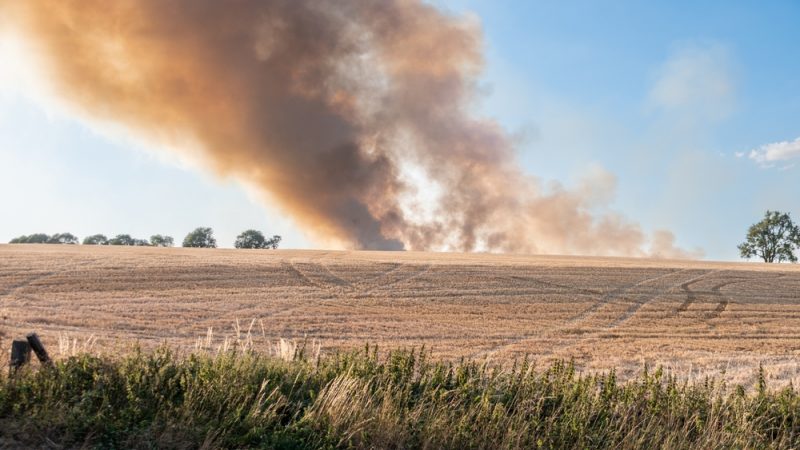
Britain is living through a quiet emergency. Fields are turning to dust after summer droughts, coastal towns are flooding in winter storms, rivers once teeming with life are now too toxic to swim in, and our wildlife populations have declined by 73% in just five decades.
These aren’t abstract environmental issues – they are symptoms of a deep and growing imbalance in the systems that keep us alive.
To grow enough food for humanity, we need healthy soils, thriving pollinators, and resilient natural systems that store carbon and stabilise our climate.
When those systems fail, the effects cascade across borders; disrupting harvests, driving up costs, and amplifying extreme weather. What happens in one part of the planet inevitably reverberates in another.
This is the story of our times; one that is rewriting the rules of security, economy, and fairness. Yet, Westminster still too often treats climate and nature as side issues, discussed in silos and forgotten between news cycles.
This is why the twin crises of climate change and biodiversity loss can never be confined by geography. These crises are not distant or separate; they are one and the same. The same burning of fossil fuels that overheats our atmosphere also drives the destruction of forests and oceans that could protect us. The same neglect that has left children breathing polluted air in London is fuelling respiratory illness, has required NHS spending, and an ever-widening gap in health inequality. As world leaders prepare to meet in Belém for COP30, the UK delegation must remember how profoundly our own wellbeing depends on a healthy Amazon; one of the Earth’s greatest carbon sinks and a regulator of global weather patterns.
READ MORE: ‘From town halls to Whitehall”: climate and nature action must start locally’
As the evidence grows and the stakes rise, a small but vocal group continues to undermine the hard-won consensus that has long united Parliament on this issue. They seek to turn science into a culture war, to delay progress for the sake of vested interests. But while their rhetoric may be loud, they remain a minority. The majority of MPs, and the British public, still understand the truth: the climate and nature crises demand urgent, united action.
That is why I am proud to launch the Climate and Nature Crisis Caucus (CNCC), a new, informal, cross-party initiative in Parliament. Our purpose is simple but ambitious: to rebuild cross-party consensus and restore the shared sense of national purpose that once defined Britain’s greatest moments of progress.
Because history tells us that when this country faces an existential challenge, we act – together. After the Second World War, we built the NHS and homes for millions. Today, the challenge is planetary, but the principle is the same: shared action for the common good.
Our economy, our health, and our security depend on the natural world’s invisible web.
The Government faces a pivotal choice. As Lord Stern reminds us, tackling climate change is not a cost, it is the greatest growth opportunity of the 21st century. With COP30 taking place in Belém next month, the UK must recognise that our prosperity is tied to the fate of the Amazon rainforest. It’s one of the planet’s last great carbon sinks – regulating global weather and absorbing billions of tonnes of CO₂ – but deforestation and rising temperatures now threaten to push it beyond a tipping point. If the Amazon dies, our climate ambitions die with it.
Sadiq Khan’s leadership shows us what is possible. In his bid to clean the city’s air, London has met its commitments 193 years earlier than expected. Contrast that with David Cameron’s 2013 decision to “cut the green crap”, a political gesture that added £22 billion to household energy bills over the next decade. The lesson is simple: short-termism is expensive. Mission-driven policy pays dividends.
Subscribe here to our daily newsletter roundup of Labour news, analysis and comment– and follow us on Bluesky, WhatsApp, X and Facebook.
This government has a chance to lead and make the UK a world leader in clean industry, renewable energy and nature restoration. But that requires coherence, ambition and courage beyond election cycles.
The CNCC exists to help Parliament do exactly that; to rebuild consensus, confront division, and restore the shared national mission to protect people, planet, and prosperity. If you are an MP who believes that climate and nature action is essential to our economy, our health and our national security, join us.
It is only by working together – across parties, communities and generations – that we can restore the connections that sustain us and turn this crisis into a legacy of renewal.
Share your thoughts. Contribute on this story or tell your own by writing to our Editor. The best letters every week will be published on the site. Find out how to get your letter published.
-
- SHARE: If you have anything to share that we should be looking into or publishing about this story – or any other topic involving Labour– contact us (strictly anonymously if you wish) at [email protected].
- SUBSCRIBE: Sign up to LabourList’s morning email here for the best briefing on everything Labour, every weekday morning.
- DONATE: If you value our work, please chip in a few pounds a week and become one of our supporters, helping sustain and expand our coverage.
- PARTNER: If you or your organisation might be interested in partnering with us on sponsored events or projects, email [email protected].
- ADVERTISE: If your organisation would like to advertise or run sponsored pieces on LabourList‘s daily newsletter or website, contact our exclusive ad partners Total Politics at [email protected].




More from LabourList
Tom Belger column: ‘Why is Labour making migrant exploitation easier?’
Ashley Dalton resigns as health minister for cancer treatment
Paul Nowak column: ‘Labour must focus on the basics’